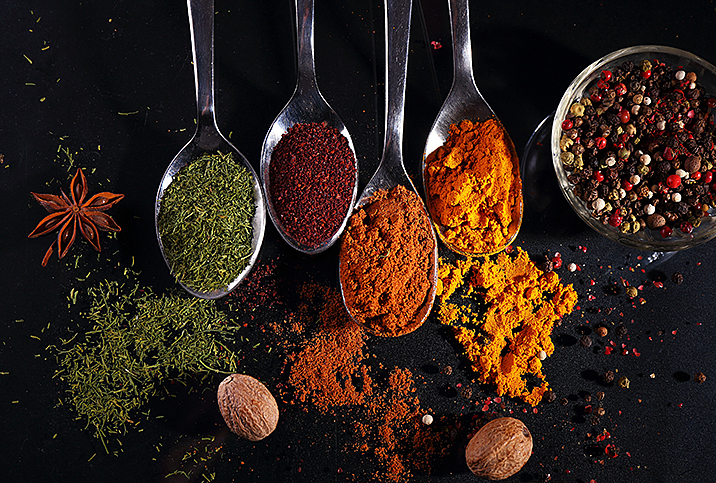Spices During Pregnancy Might Just Be a Woman's Best Friend

Pregnancy is difficult for a variety of reasons, including the long list of do's and don'ts that comes with it. There are a ton of foods you shouldn't eat, but when those pregnancy cravings hit, what can you reach for?
We talked to health experts to get the lowdown on the topic, and we've got great news for spice lovers.
Keep spices balanced during pregnancy
"As the pregnancy progresses, the woman's body changes, hormones are raging and we can crave foods that [we] never [did] before," said Marta Horvath, a certified nutritionist, personal trainer and the founder of Honu, a health development agency in Zalaegerszeg, Hungary. "These can be spicy, hot foods, loads of sweets, etcetera. Obviously, there's no need to live an ascetic lifestyle, but moderation is key."
Adapting a balanced, clean diet, which includes these foods, is crucial during pregnancy:
- Whole foods
- Foods with no artificial ingredients
- Organic meats, fish and eggs
- Loads of colorful vegetables and fruits
- Healthy sources of carbs, such as rice and millet
Don't forget those prenatal vitamins and minerals to help ensure you and your growing baby are getting enough of the nutrients you need.
The spice of life
Women often experience heartburn during pregnancy, especially in the second and third trimesters as the growing baby puts pressure on the stomach. So super-spicy foods aren't for everyone.
However, most spices are also considered herbs and can be helpful in soothing uncomfortable symptoms. For example, ginger tea can ease morning sickness.
"Some spices are actually beneficial to use in pregnancy as they add nutrients and essential minerals to foods consumed; others may increase risk of uterine contractions and, hence, place you at risk for preterm labor or bleeding if you have an abnormal placentation," said Kecia Gaither, M.D., a board-certified OB-GYN and maternal-fetal medicine expert in the Bronx, New York.
According to Gaither, the following spices can be tasty and come with many health benefits:
Black pepper
Black pepper is rich in chromium, a mineral that can reduce blood sugar levels and cholesterol. It's also heart-healthy and decreases the risk of diabetes.
White pepper
By stimulating bowel movements, white pepper is helpful if constipation is an issue.
Ginger
Ginger is an effective antiemetic, thus, good for soothing the stomach and beneficial for morning sickness.
Cinnamon
Cinnamon may help reduce blood pressure.
Turmeric
Turmeric has anti-inflammatory properties and helps to reduce oxidative stress, which occurs when there is an imbalance between antioxidants and free radicals in the body.
Paprika, garlic, curry, chili and onion powders
These spices are high in folate, meaning they're beneficial for developing the neurological system of the fetus. Along with ginger, these spices are high in vitamin E and useful for red blood cell production.
If you choose to use any lesser-known spices, Gaither suggested checking with your healthcare provider first to be on the safe side.
Separating fact from fiction
Some herbs and spices have medicinal or toxic effects if used in high quantities, such as in tinctures, extractions and oils. However, the amount used in food preparation isn't enough to cause any danger to the pregnant person or the developing fetus, Horvath explained.
You may have heard scary stories about the following seasonings, but here are the myths along with some reality checks:
Anise
Myth: It can cause a miscarriage.
Reality: This popular flavoring is safe and there is no evidence that it causes pregnancy complications. In fact, if you're a fan of licorice (which should be avoided during pregnancy), anise makes a great alternative. It has a similar flavor profile to real licorice and is often used to make licorice-flavored products, such as Twizzlers.
Basil
Myth: It has labor-inducing effects.
Reality: The amount used as a seasoning in food preparation is not enough to cause premature birth.
Cinnamon
Myth: It can affect blood clotting.
Reality: The occasional cappuccino or cup of fruit flavored with cinnamon isn't likely to cause a problem. Of course, daily consumption of large quantities is not recommended.
Thyme
Myth: It can cause premature birth.
Reality: Thyme oil used for medicinal purposes is not recommended during pregnancy, but it is safe to sprinkle the dried herb on food, according to researchers.
Parsley
Myth: The myristicin in parsley can cause miscarriage.
Reality: Parsley does contain myristicin, which can cause miscarriage, but the parsley leaves contain such a small amount of essential oil (0.1 percent to 0.7 percent)—which also evaporates during cooking—that the content of the active ingredient in "kitchen quantities" is insignificant.
Oregano, sage, pepper, saffron, rosemary, marjoram and cumin
Myth: These seasonings can cause an abundance of blood in the lower abdomen and, thus, increase the risk of miscarriage or premature birth.
Reality: For this to be true, a pregnant person would have to use and consume, by human standards, an unrealistic quantity of dried spices.
Remember to use caution
Very few studies have been conducted on the effects of these herbs on pregnant mothers. The majority of research has been performed on animals. We can draw certain conclusions from these studies, but they are not completely authoritative.
Caution is also advised when considering herbal supplements, which contain higher concentrations than you use in food preparation. Additionally, most supplements have not been evaluated for safety during pregnancy. Always consult your doctor before adding any supplements to your diet.
Horvath suggested using and consuming high-quality spices and foods from organic farms and taking your individual sensitivities into account, along with the changes affecting your body.
"If you suffer from excessive heartburn in the last trimester, avoid hot, spicy, fatty foods and replace them with gentle, easily digestible meats, vegetables, fruits and carbohydrate sources," she concluded.


















